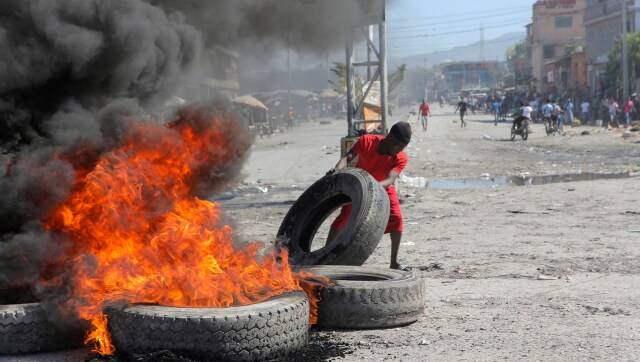UN calls for army intervention in Haiti after angry residents lynch alleged robbers to death
According to witnesses in the Canape-Vert neighborhood, the violence began before daybreak when gang members stormed into many residential sections of the city, looting homes and attacking inhabitants

Representational Image. Reuters
Port-au-Prince: Residents of the Haiti’s capital city allegedly lynched and burned alive nearly a dozen suspected criminals after they allegedly attempted to flee from police after breaking-in and robbing multiple houses.
According to reports, as many as 13 men allegedly endured beatings with tyres doused in gasoline before being set ablaze in Port-au-Prince on Monday.
Grounds reports suggested that the accused gang members were allegedly fleeing in a minibus after carrying out robberies.
Minutes before they were lynched police had taken away their guns following a search. They have not disclosed how the public came into possession of the suspects.
According to witnesses in the Canape-Vert neighborhood, the violence began before daybreak when gang members stormed into many residential sections of the city, looting homes and attacking inhabitants.
The violence started before dawn, when gang members burst into several residential areas of the capital, looting homes and attacking residents, according to witnesses in the Canape-Vert district.
“It was the sound of projectiles that woke us up this morning. It was 3:00 am, the gangs invaded us. There were shots, shots,” a resident of the neighboring district of Turgeau told AFP news agency.
Another homeowner told AFP that if the gangs came to assault them, “we will defend ourselves, we too have our own weapons, we have our machetes, we will take their weapons, and we will not flee.”
Police spokesperson Gary Desrosiers said that the lynched individuals were a group of armed bandits traveling in a vehicle in the capital, and the police had sought to arrest them.
He also confirmed that in a separate incident, notorious crime boss Carlo Petithomme — who led a gang known as Ti Makak — was dead.
Violence in Haiti
Since the assassination of Haiti’s president, Jovenel Mose, in July 2021, the country has grown increasingly lawless.
The UN asserted in a study issued on Monday that the capital’s level of insecurity had surpassed that of war-torn countries.
Conflicts with the police and other gangs have “become more violent and more frequent,” according to the report, and armed gangs are still competing with one another to control more land.
The UN reports that between April 14 and April 19, gang violence claimed the lives of nearly 70 people, including 18 women and two children.
Many hospitals, schools, and other services have had to close due to the violence. Access to many goods and services has also been restricted.
The study claims that “the people of Haiti continue to experience one of the worst humanitarian emergencies in decades.”
Since Mose’s death, Prime Minister Ariel Henry has been in charge of the Caribbean nation, but he has been unable to rein in the gangs, who apparently now control 60% of the capital.
Henry and UN officials have repeatedly called for the mobilisation of a worldwide force to assist police in their struggle against criminal gangs.
So far, no country has offered to lead such a force. The United States has been pressuring Canada to take the position, but Justin Trudeau has so far declined.
Henry asserts that permitting the staging of the long-delayed elections depends on providing security.
UN’s reaction
Following the incident the United Nations chief urged the immediate deployment of an international armed force in Haiti to stem escalating gang violence and the country’s worst human rights crisis in decades, warning in a new report that insecurity in the capital “has reached levels comparable to countries at war.”
(With inputs from agencies)
Read all the Latest News, Trending News, Cricket News, Bollywood News,
India News and Entertainment News here. Follow us on Facebook, Twitter and Instagram.
also read

Explained: Why the path towards peace in Yemen remains shaky
After eight years of conflict and hundreds of thousands of civilian deaths, it is the Yemeni people who have lost the most in this war. Houthi and Saudi officials may claim a political solution is underway, but whether this will have a much-needed humanitarian component remains a question

US to send additional troops to Djibouti in case of eventual evacuation in Sudan, as heavy gunfire breaks out
Last weekend saw the start of a violent power struggle between forces led by two formerly associated members of Sudan's ruling council that have so far claimed more than 330 lives and plunged the country into what the UN has dubbed a humanitarian crisis
